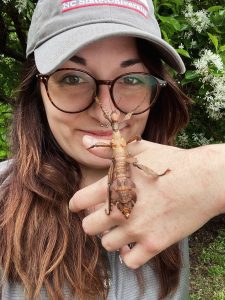Evolutionary trends in the antimicrobial properties of wood-feeding insect feces
Spring 2022 Graduate Student Award in Pathogenic & Commensal Organisms
 Wood-feeding insects have not only evolved to thrive on a difficult-to-digest and nutrient-poor diet, but also live under intense pathogenic pressure due to the tendency of rotting wood to support significant amounts of fungal and bacterial growth. While the gut microbiomes of wood-feeding insects play a key role in symbiotic lignocellulose digestion, their fecal microbiomes include many antibiotic-producing members of Actinobacteria, a phylum which includes genera like Actinomyces and Streptomyces that have long been known for their capacity to produce antibiotics. The association between wood-feeding insect feces and actinobacteria has been described through studies on the feces-lined nests of wood-feeding beetles and subterranean termites, and the distribution of antibiotic-producing bacteria in the feces of wood-feeding insects may have an evolutionary basis. However, addressing this evolutionary link is not possible without a comparative analysis of the composition and antibiotic properties of fecal microbiomes in wood-feeding species and their close non-wood-feeding relatives. I propose a project in which I will use a combination of microbiome sequencing and antimicrobial assays to compare evolutionary and ecological patterns among the gut and fecal microbiomes of several wood-feeding insect taxa and use the resulting data to address the following questions: To what extent have the evolution of wood-feeding and sociality played a role in determining the antimicrobial properties of feces? How has wood-feeding shaped the phylogeny of feces-associated antimicrobial-producing bacteria?
Wood-feeding insects have not only evolved to thrive on a difficult-to-digest and nutrient-poor diet, but also live under intense pathogenic pressure due to the tendency of rotting wood to support significant amounts of fungal and bacterial growth. While the gut microbiomes of wood-feeding insects play a key role in symbiotic lignocellulose digestion, their fecal microbiomes include many antibiotic-producing members of Actinobacteria, a phylum which includes genera like Actinomyces and Streptomyces that have long been known for their capacity to produce antibiotics. The association between wood-feeding insect feces and actinobacteria has been described through studies on the feces-lined nests of wood-feeding beetles and subterranean termites, and the distribution of antibiotic-producing bacteria in the feces of wood-feeding insects may have an evolutionary basis. However, addressing this evolutionary link is not possible without a comparative analysis of the composition and antibiotic properties of fecal microbiomes in wood-feeding species and their close non-wood-feeding relatives. I propose a project in which I will use a combination of microbiome sequencing and antimicrobial assays to compare evolutionary and ecological patterns among the gut and fecal microbiomes of several wood-feeding insect taxa and use the resulting data to address the following questions: To what extent have the evolution of wood-feeding and sociality played a role in determining the antimicrobial properties of feces? How has wood-feeding shaped the phylogeny of feces-associated antimicrobial-producing bacteria?
Marissa is a PhD student in the Mikaelyan Lab at NC State University studying the interactions between termite diet, gut and fecal microbiomes, and social behavior, particularly the exchange of gut fluids via trophallaxis. She is also interested in the use of insects, particularly termites, as a sustainable component of feed for food animals. Marissa was born and raised in the Triangle, earning a Bachelor’s degree in Biology at Meredith College, and an Associate in Science from Wake Technical Community College, both in Raleigh, North Carolina. She enjoys volunteering for outreach events and sharing her love of entomology with people of all ages and backgrounds by being involved in the community both on- and off-campus through the Entomology Graduate Student Association (EGSA) at NC State and by volunteering at local museums.